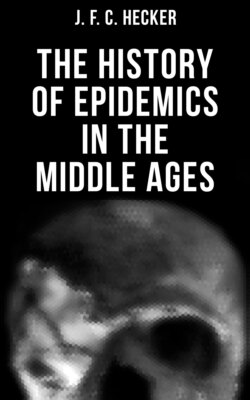Читать книгу The History of Epidemics in the Middle Ages - J. F. C. Hecker - Страница 8
На сайте Литреса книга снята с продажи.
CHAPTER I.
GENERAL OBSERVATIONS.
ОглавлениеTable of Contents
That Omnipotence which has called the world with all its living creatures into one animated being, especially reveals himself in the desolation of great pestilences. The powers of creation come into violent collision; the sultry dryness of the atmosphere; the subterraneous thunders; the mist of overflowing waters, are the harbingers of destruction. Nature is not satisfied with the ordinary alternations of life and death, and the destroying angel waves over man and beast his flaming sword.
These revolutions are performed in vast cycles, which the spirit of man, limited, as it is, to a narrow circle of perception, is unable to explore. They are, however, greater terrestrial events than any of those which proceed from the discord, the distress, or the passions of nations. By annihilations they awaken new life; and when the tumult above and below the earth is past, nature is renovated, and the mind awakens from torpor and depression to the consciousness of an intellectual existence.
Were it in any degree within the power of human research to draw up, in a vivid and connected form, an historical sketch of such mighty events, after the manner of the historians of wars and battles, and the migrations of nations, we might then arrive at clear views with respect to the mental development of the human race, and the ways of Providence would be more plainly discernible. It would then be demonstrable, that the mind of nations is deeply affected by the destructive conflict of the powers of nature, and that great disasters lead to striking changes in general civilization. For all that exists in man, whether good or evil, is rendered conspicuous by the presence of great danger. His inmost feelings are roused—the thought of self-preservation masters his spirit—self-denial is put to severe proof, and wherever darkness and barbarism prevail, there the affrighted mortal flies to the idols of his superstition, and all laws, human and divine, are criminally violated.
In conformity with a general law of nature, such a state of excitement brings about a change, beneficial or detrimental, according to circumstances, so that nations either attain a higher degree of moral worth, or sink deeper in ignorance and vice. All this, however, takes place upon a much grander scale than through the ordinary vicissitudes of war and peace, or the rise and fall of empires, because the powers of nature themselves produce plagues, and subjugate the human will, which, in the contentions of nations, alone predominates.
